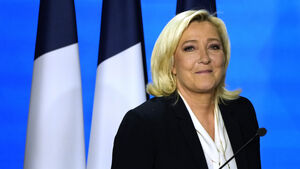Populist tide may sweep away EU cohesion

In France, Marine Le Pen's National Rally is already eyeing potential coalition partners after the EU polls, sensing its best-ever chance to stamp its stamp on the European project. Pictuer: AP Photo/Francois Mori
A swelling tide is rising across Europe, carrying seeds of uncertain political change in its currents. From rustic villages to teeming city streets, a populist swell is gaining strength and force, powered by a potent mix of economic anxieties, cultural dislocation, and a widespread sense that the establishment has turned a tone-deaf ear to the people's voice.
This is fast becoming an era of grassroots reactionary movements - a rebirth of populist politics channelling the fears and frustrations of those who feel dispossessed by globalisation's relentless march. Amid unprecedented shifts in demographics, labour markets, and technology, a chorus of outraged voices now promises to reclaim what they see as the lost soul of their native lands.
The rallying cries come from both the far right and the far left, but it is the nationalist, conservative siren song that has rung most loudly of late across the continent. From Poland's Law and Justice Party to France's National Rally, a fresh breed of populists has harnessed a simmering discontent and recast it as a patriotic cause. Their rhetoric is, by turn, defiant and aggrieved, rooted in a narrative of belonging and identity under threat from uncontrolled immigration, remote bureaucracies, and a Brussels-led liberal agenda hostile to traditional values.
In this feverish climate, facts matter less than perceptions stoked by deft narrators. The populist vanguard has proven masterful at weaving complex insecurities into a story of endangered sovereignty, ethnic self-determination, and the encroachments of a cosmopolitan globalist agenda. The narrative has an unmistakably blood-and-soil undertone of ethnic insularity that should give modern, secular societies pause for thought.
As Europe braces for a fresh round of parliamentary elections, the populist shockwaves emanating from Italy and Poland grow too challenging to ignore. Under Giorgia Meloni and her Brothers of Italy party, the Italian government has boldly staked out a socially conservative, Eurosceptic agenda that has found admiring echoes from like-minded quarters across the continent. Meanwhile, Poland's ruling Law and Justice party continues to dismantle judicial independence and democratic norms with assured defiance.
These developments resonate because they give shape to the visceral but inchoate sense of alienation and angst that has been building like atmospheric pressure across many European societies, including Ireland. Italy and Poland represent the populist idea unleashed - a glimpse of what can happen when that free-floating anxiety over rapid social change and ethnic makeover gets harnessed by deft discontents adept at channelling it.
For Italy's Meloni, defending a Christian, Catholic nation's values and traditions against the march of secular progressivism, immigration, and activism is the raison d'être. Scepticism of EU overreach and climate policies is part of the same narrative. Poland's populists have taken the script further, waging an overtly anti-democratic war on judicial autonomy and media freedoms in their own self-styled culture war.
Though operating in different contexts, an undeniable political philosophy links these populist movements, giving the phenomenon a powerful impetus. Both Meloni and Poland's Jaroslaw Kaczynski are tapping into deep personal and communal identity anxieties that have festered across the continent, catalysed by the social and economic volatility of the 21st-century experience.
The roots of this discontent are not hard to identify: relentless automation and deindustrialisation hollow out traditional working-class communities; mass immigration and population shifts accentuate cultural fissures; a debilitating trust deficit in institutions amid unaccountability and widening inequality; growing intergenerational divides and a fraying social fabric as traditions and faith practices erode.
Into this heady climate of trepidation, suspicion, and fragmentation have stepped political entrepreneurs adept at shaping a narrative of civilisational struggle and national rediscovery. After decades of being criticised as backwater anti-progressivists, it insists those who cherish ethnic belonging and honoured customs can rescue past glories and direct the winds of the future.
While this reactionary brand of populism currently holds court in Italy and Poland, tremors are discernible across the continent's political landscape. In France, Marine Le Pen's National Rally is already eyeing potential coalition partners after the EU polls, sensing its best-ever chance to stamp its stamp on the European project. And here in Ireland, smaller movements have erupted in recent months in response to the radically transformed demographics and the extended rule of a Government coalition tethered to the dictates of an increasingly autocratic Brussels.
Political parties, like the Irish Freedom Party, are outliers but part of the same reactionary continuum. Like elsewhere, the Irish national question has morphed into an identity one, with depictions of a diluted essence needing rediscovery gaining credible currency.
As Europe's political kaleidoscope prepares to turn again, the tidal forces reshaping it are undeniable. An assertive new wave of populist politics - one as ethnically charged as it is economically incohesive - is rising steadily across the continent. The Italian and Polish strains may prove harbingers of what is still to crest in the Irish Republic.
Whether this populist tide is simply the cyclical political backlash of a traumatic era of frenetic change or an existential challenge to the EU's liberal democratic foundations remains unclear. But its effects are already apparent in national debates' polarised and mercurial state. As establishment parties watch their flanks in Ireland, paralysis and pandering are equally plausible responses as the next electoral tests approach. For those determined to counteract the populist surge, steadying nerves and finding compelling new language to address the root causes of discontent will be imperative.

Ireland is ripe for division. Once a byword for traditional Catholic piety and rural cohesion, the nation's transition to a diverse, urban-dwelling and robustly secular society has been head-spinningly rapid for some. The whiplash of change and entry into an era of European dictates and deepening integration inevitably bred an unfolding backlash.
Those calling for a recovery of Ireland's ethnic Gaelic roots and unyielding defiance in the face of perceived cultural surrender have found a disenchanted and spooked audience. Rural Ireland's fading homogeneity and the spectre of cultural oblivion have found perfect harmonic convergence in a resurgent tribalism.
While their support remains untested electorally, these factions represent a broader swell of populism across the European continent that can no longer be ignored or dismissed. For every rally cry, there is an underlying socio-economic grievance about the material realities and emotional disruptions of the modern experience that resonates. The populists of all stripes are tapping an artery of discontent, making a compelling case that only they can heal the rift that globalism and liberal institutionalism have wrought in the national fabric.
It is a seductive allure to those unmoored - economically, culturally, psychologically - by the dizzyingly transformative churn of the new century's global marketplace and demography. Theirs is a revitalised nostalgia for recovered sovereignty, ethnic primacy, and a longed-for monoculture restored. But it is a reality wrapped in ephemeral assurances seductive to those dislocated souls who see time-honoured traditions withering and markers of identity fading.
So swells the populist tide, cresting over the once-impregnable bulwarks of the postwar liberal order and traditional civic patriotism. It is uncertain whether its swell represents a cyclical backlash destined to break and recede. But in the strength of its rising, canvassers are feeling rippling currents on every doorstep, the length and breadth of the country before the Local and European elections. The one-time fringe tests the centre like a swollen spring breaching a rickety dam. How it is held back - or channelled - may determine the course of the European project for generations.




